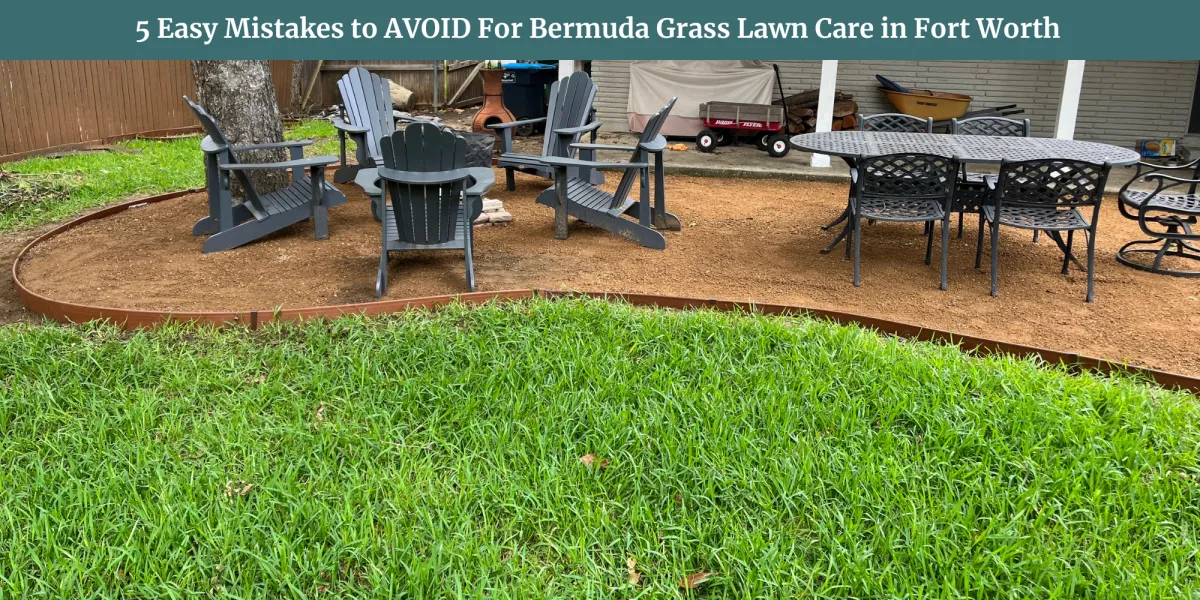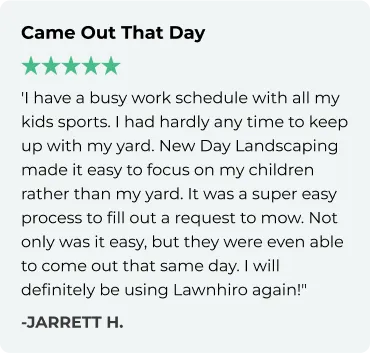
5 Easy Mistakes to AVOID For Bermuda Grass Lawn Care in Fort Worth
After working with hundreds of Fort Worth yards over the years, I've seen firsthand how our Texas heat and soil conditions create unique challenges for Bermuda grass lawns. Many of my clients come to me frustrated that their Bermuda isn't looking as thick and lush as they'd hope, especially during as spring is starting to make way for the brutal summer months.
The good news? Most Bermuda lawn problems stem from a handful of common mistakes that are easy to fix once you know what to look for.
A quick shout-out to the team at Lawn Insider for their excellent video on Bermuda grass care. Their insights helped inspire some of the local tips we're sharing today. As a Texas native with over 10 years in the landscaping business, I've developed specific lawn care techniques that work for our Fort Worth climate. Our 95% client retention rate speaks to how effective these methods are.
Today, I'm sharing the five most common Bermuda grass mistakes I see in our service area and how you can avoid them to get that enviable green lawn your neighbors will admire.
1. Mowing Your Bermuda Lawn Too High (Especially in Fort Worth Heat)
One of the biggest mistakes I see across Fort Worth neighborhoods from Overton Park to Benbrook is homeowners cutting their Bermuda grass too high. Many folks follow the general lawn care advice to set their mower at the highest setting, but that's actually counterproductive for Bermuda in our Texas climate.
Here in Fort Worth, where summer temperatures routinely hit 100+ degrees, Bermuda grass thrives when kept shorter – about half an inch to an inch in height. At New Day Landscaping, we maintain Bermuda lawns at this lower height because it encourages the grass to grow laterally rather than vertically.
This is especially important for our local lawns because Bermuda spreads through stolons (above-ground runners) and rhizomes (underground stems). When we mow low, we signal the grass to focus on spreading outward, creating that dense, carpet-like turf that stands up to our Texas heat and resists drought better.
When you let Bermuda grow taller than about two inches, it becomes leggy and thin – something I've had to help many clients correct after they followed generic lawn advice not suited for our region. The thinner lawn then creates openings for our persistent Texas weeds to take hold, starting a frustrating cycle.
2. Not Mowing Frequently Enough During Our Long Growing Season
Another common issue I see throughout Fort Worth is not mowing Bermuda grass frequently enough. Our growing season here is long – from early spring through late fall – and Bermuda grows incredibly fast during our warm months.
Many of my clients initially try mowing every other week, but this simply doesn't work for Bermuda in our climate. When the grass grows too tall between cuts, you end up scalping it, which causes those brown patches many people mistakenly attribute to drought or disease.
For the best results in our Fort Worth climate, I recommend mowing Bermuda lawns at least once a week during peak growing season (May through September). For clients who want that truly manicured look, twice-weekly mowing delivers exceptional results, especially in premium neighborhoods like Tanglewood or Overton Park.
When we handle lawn maintenance for our Fort Worth clients, we adjust our mowing schedule based on growth rates throughout the season, ensuring consistent height that promotes that thick, carpet-like appearance Bermuda is known for.
3. Overwatering Your Bermuda (A Common Fort Worth Water-Waster)
Watering incorrectly is perhaps the most widespread mistake I encounter across Fort Worth. With our clay-heavy soil and occasionally extreme heat, many homeowners assume more water is always better – but that's not the case with Bermuda grass.
Even in our hot Texas climate, Bermuda only needs about one inch of water per week. During my lawn consultations across Crowley and Fort Worth neighborhoods, I often find irrigation systems running daily or every other day for short periods, which trains grass roots to stay shallow and creates weaker lawns.
Instead, I recommend watering deeply but infrequently – ideally just once or twice per week, applying a half-inch to an inch of water each time. This encourages deep root growth, which is crucial for surviving our occasional water restrictions and intense summer heat.
For our maintenance clients, we install rain gauges (and check them regularly) to ensure lawns receive precisely the right amount of water. This has helped many of our Fort Worth customers reduce their water bills while improving their lawn's health – it's one reason we maintain our 95% client retention rate.
4. Overseeding Hybrid Bermuda with Common Bermuda Seed
I see this mistake frequently in newer Fort Worth developments where builders installed hybrid Bermuda sod. When homeowners notice thin spots, they often purchase Bermuda seed from local stores to fill in the gaps – not realizing they're creating a bigger problem.
Most bagged Bermuda seed is common Bermuda, which looks noticeably different from the hybrid varieties typically used in our better Fort Worth lawns. The result is a patchy, inconsistent appearance that's hard to fix once established.
Instead of overseeding, I teach our clients to help their existing Bermuda spread naturally by following proper mowing and watering practices. For severe bare spots, we sometimes recommend sodding with matching hybrid Bermuda rather than seeding. This approach ensures consistent color and texture throughout the lawn.
5. Trying to Grow Bermuda in Fort Worth's Shaded Areas
This fifth mistake is particularly relevant to our older Fort Worth neighborhoods with mature trees. Bermuda grass loves sun – and struggles significantly in shaded areas. Here in Fort Worth, I've worked with numerous clients who've fought unsuccessfully to grow Bermuda under our beautiful oak and pecan trees.
In our local climate, Bermuda needs at least 6-8 hours of direct sunlight daily to thrive. When I consult with clients in established neighborhoods like Tanglewood, I often recommend selective tree trimming to allow more light to reach the lawn. For heavily shaded areas where removing trees isn't an option (or desired), transitioning to shade-tolerant groundcovers or creating mulched beds offers better long-term solutions than battling with Bermuda.
This approach not only creates more attractive landscapes but saves significant frustration and resources trying to grow grass in areas where it simply won't thrive in our Fort Worth environment.
Fort Worth-Friendly Bermuda Grass Success Plan
By avoiding these five common mistakes, you can transform your Fort Worth Bermuda lawn from struggling to stunning:
Cut your Bermuda lower than other grass types. For our Fort Worth climate, maintain Bermuda between 0.5-1 inch in height to promote lateral growth and drought resistance.
Mow frequently during our long Texas growing season. Weekly mowing (twice weekly for premium results) prevents scalping and encourages that dense carpet-like appearance.
Water deeply but infrequently. Even in our Texas heat, Bermuda thrives with just 1 inch of water weekly, preferably delivered in 1-2 longer sessions rather than frequent short waterings.
Let your existing Bermuda spread naturally to fill in bare spots. Avoid overseeding hybrid Bermuda with common Bermuda seed, which creates a patchy, inconsistent appearance.
Embrace alternatives for heavily shaded areas. In Fort Worth's mature neighborhoods, consider shade-tolerant landscaping options rather than fighting to grow Bermuda where it won't thrive.
At New Day Landscaping, we've helped hundreds of Fort Worth homeowners transform their Bermuda lawns using these locally-proven techniques. Our comprehensive lawn care programs are specifically designed for Fort Worth's unique climate and soil conditions.
Need help with your Bermuda lawn? Contact us at (817) 760-0479 or schedule a lawn consultation today. We serve homeowners throughout Fort Worth, Benbrook, Crowley, and surrounding areas.




